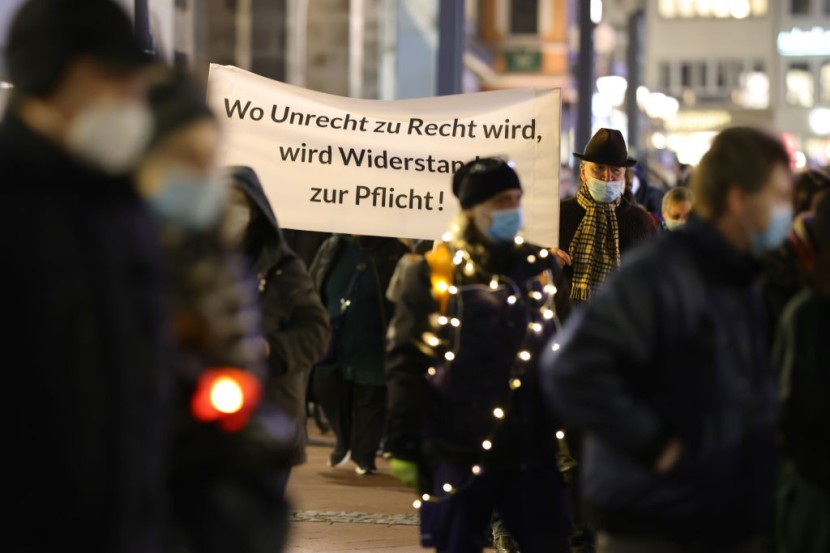
Thousands of protesters across Germany launched a movement to support the government's restrictions and proposed vaccine mandate, which is set to be debated by lawmakers on Wednesday.
The activists have signed manifestos against illegal anti-vaccine demonstrations in cities including Leipzig, Bautzen, and Freiberg. While other groups have formed human chains to push back far-right protesters. Several medical students held a silent vigil outside a medical facility in Dresden as a protest to vaccine naysayers.
The majority of Germans, particularly those at high risk of COVID-19 infection, have decided to adopt health protocols such as social distancing, vaccination, and looking out for one another to protect themselves. However, there is a vocal minority that denies the reality of the pandemic, per AP News.
However, a portion of the anti-vaxxers recognize the ongoing pandemic, but they fear the potential side effects of the vaccines. Some of them think that the authorities have been aggressive in imposing restrictions.
Read Also: Germany's Daily COVID-19 Cases Surpass 100,000; Health Official Says Numbers Have Not Peaked Yet
Silent Majority Versus the Loud Minority
The new counter-protesters state that the radical vaccine refusers have gained too much media coverage and have attained too much influence over the public discussion on how Germany should manage the surge in COVID-19 infections.
On Monday, German President Frank-Walter Steinmeier encouraged the country's silent majority to stand up and "become politically recognizable."
"The silent center must become more visible, more self-confident, and also louder," President said on in a panel in Berlin.
Debate on Vaccine Mandate Kicks Off
The pro-vaccine activists' demonstrations happened at a period when Germany's society may become even more divided as parliament debates a universal COVID-19 vaccine requirement.
Previously, German politicians of all stripes have insisted that the government would not implement a vaccine mandate. However, the large number of resistance have obstructed the country's fight against the coronavirus, and the number of infections swelled significantly last year, which turned the table.
Before becoming chancellor in December, Olaf Scholz expressed his support for a vaccine mandate, implying that it would be enforced in February or March, per ABC News.
Lawmakers are due to start the proceedings with an "orientation debate" on Wednesday. However, it is unclear when the legislators will cast their votes. But observers predict that it could be well into the spring before any law takes effect.
Scholz's three-party ruling coalition has so far come up with three suggestions.
One proposal indicates a vaccine requirement for everyone over the age of 18, which would be valid for two years and cover a maximum of three injections, with fines for those who refuse. A competing proposal calls for mandatory counseling sessions for the unvaccinated, followed by a vaccine mandate for those over the age of 50 if progress is insufficient. One group, on the other hand, is opposed to any mandate.
The measures on how compliance would be checked are not yet defined as Germany lack a central vaccination register.
Last month, the German government passed legislation requiring hospital and nursing home employees to produce proof of full vaccination or recovery from COVID-19 by mid-March.
At least 73.5 percent of Germany's 83 million citizens have already been adequately vaccinated, with 50.8 percent receiving a booster dose, per Reuters.
Related Article : Germany Could Impose Stricter Rules on Unvaccinated Residents; Proof of Vaccination, Negative COVID-19 Test Required To Ride Public Transportation








